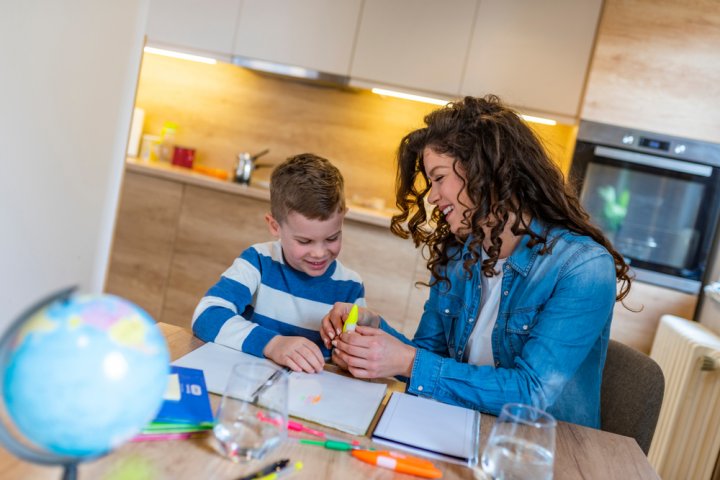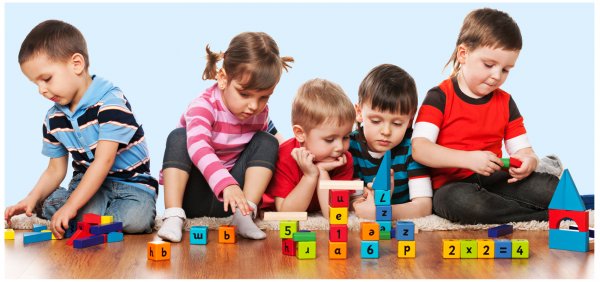-
 Whether You Have a Reluctant Reader or Budding Bookworm, Check Out These Surefire, Kid-Tested Books Which Will Help Your Child Grow (2019)
Whether You Have a Reluctant Reader or Budding Bookworm, Check Out These Surefire, Kid-Tested Books Which Will Help Your Child Grow (2019)
-
 Encourage Your Child's Creativity: Check Out These Paint Brushes for Kids that are Durable and Easy to Grip, Helping Children Paint with Confidence
Encourage Your Child's Creativity: Check Out These Paint Brushes for Kids that are Durable and Easy to Grip, Helping Children Paint with Confidence
-
 Find the Perfect Birthday Gift for a 4-Year-Old Girl: Pick from the Top 10 Toys and Games for Girls in 2018
Find the Perfect Birthday Gift for a 4-Year-Old Girl: Pick from the Top 10 Toys and Games for Girls in 2018
The Joy of Parenting

It is an amazing feeling to see your child grow day by day. It brings a lot of joy as well as a lot of worry as to how you should discipline your child so that he grows up to be a responsible person. Once the child is a preschooler they are not your little baby anymore. These years are called the wonder years because during this time the child learns to manage himself and also to control his emotions.
Building a Strong Bond with Your Child: Why It is Important

It is very crucial to have a great relationship with your child as it affects them in their mental and physical development like communication skills, self regulation, sibling and peer relationships, academic achievements etc. Your bond with your child helps him to form a foundation and develops their behavior.
Other benefits or creating a strong bond with your child are:
- Having a strong bond and attachment with your child will help him to develop and content relationship with others later in their lives.
- Children with a relationship with their parents can regulate their emotions when they are in stress or a difficult situation.
- It also helps in promoting your child's mental, linguistic and emotional development.
- It helps them to create a better social and academic skills as they are more confident knowing they have the backing of their parents with them all the time.
Preschool Years: Build a Foundation of Being Involved in Your Child's Life

Preschool years are very important in a child's life, this is the time when they develop their cognitive skills and start their education process. This is also the time when they need their parent's support to develop completely.
It is important for the parents to be involved in their school as well as the lessons learned outside of a classroom to help them perform well in their lives. When a parent is involved in a child's school and their lives outside of school they establish a connection and know what is going on in their minds, this lets them help their child in his development and support their learning process.
Supporting your child's mental health is very important as well. Having a bond with your child helps them develop a self-esteem and lets them fight off the negative emotions. It lets them see things in a more positive way and is able to cope up with many negative situations they face in their lives like bullying etc.
Effective Parenting Tips for Preschoolers

Being a parent is the hardest job in the world. You want to give all the love you can in the world to your child but do not want to spoil them either. There are many ways through which you can do that. Parenting is tough but not impossible.
Here is a list of tips which can help you be an effective parent and disciple your preschooler without spoiling him.
Build Their Communication skills

Communication skills are very crucial. As they go out to school they will meet many different people. They are used to communicating with their parents but preschool is the place where they are able to communicate with teachers and other students. It is important to polish their communication skills. Talk to them, teach them new vocabulary, correct them when they do not use an appropriate word and don't laugh at them as it might hurt their confidence.
Make Them Comfortable with Teamwork

Another important skill is teamwork. They will be spending a good amount of time in school and will have to work with many different people. They should know who to work in a team. They will be taking part in group activities therefore you should encourage them to learn this skill. Start at home by making teams, distributing work among the team. It could be with their sibling or with either parent. Play games that encourage them to make teams like making puzzles, or an art project etc.
Teach Them Independance

Teach them to be independent. This is the time when you teach them to do small tasks by themselves. At times we feel that the child will not be able to do a task by themselves or you can do a better job at it but let them try their hand in it. Let them get dressed by themselves, ask them to help you in the kitchen, lay the table before dinner, remove the dirty dishes, dust the living room, ask them to put their toys away and clean their room by themselves. It will help them to learn as well as feel the feeling of pride when they accomplish a task without your help.
Develop Their Problem Solving Skills

Let them solve simple problems by themselves. If you see your children trying to reach over the fridge for his favorite cookie ask them to think how they can get there. Tell them to grab a stool and do it themselves rather than handing it to them. These are the times when you child is building his character and you need to know that you won't be with them all the time to help them out, they need to learn to do it themselves. Don't cheat them of the experience of success by doing everything for them.
Teach Them to Be Safe

Since your child will be away amidst a lot of strangers it is important for him to learn to keep himself safe. Here are a few things you should teach your child before he heads to his school.
- Teach him to stay out of traffic and not to play or run on the street.
- Teach him to ride his tricycle on the sidewalk and the importance of wearing a helmet.
- Check for any loose or sharp objects before giving them a toy and ask them to check the playground equipment before using them.
- Tell him that you are watching him while he plays outside and you will be with him as soon as he needs you.
- Teach the kid to swim and teach him to stay in the kid section of the pool at all times.
- Teach him to be safe around strangers, not to talk to them or take any gifts from them. Teach them the danger zones where no one can touch them.
- Teach him to wear a seat belt when sitting in a car, to lock the doors and stay away from it.
Don't Make Yelling a Habit

We tend to get irritated when a child misbehaves and end up yelling at them. Most of the time we use a lot of negative words like doesn't hit, don't throw, etc. It is important to use a lot of positive words when working with children. Praise them; give them a hug or a kiss when they do something good. Appreciate them by saying thank you for being polite in front of the guests or you did well by sitting quietly while the adults were talking, etc.
Make Chores a Part of Their Life

Make sure you give your child simple chores around the house. It will keep them busy as well as teach them to be responsible. Ask them to water the plants, feed the pet or make their own bowl of cereal. It will help them to feel capable and let them feel like a contributing member of the family.
Kids love to have fun, therefore, try to make them responsible by turning their chores into fun. If you see him make a face when assigned a chore turn it into a game. For example, if you want him to put the shoes away ask him to be the shoe store manager and fix the shoes in the store.
Adopt an Encouraging Attitude

We may think that the child does not have an ego but it is there; It is in a latent state and it develops as they grow older. Try patting him in the back when he does something good this will encourage him to do well the next time but do not over feed the ego as it will be destructive for him later in life.
Don't Order Them About

No one likes to be ordered around. Our children also do not appreciate an authoritative tone all the time. You should talk to them in a loving manner if asking them to do something around the house. An authoritative tone leads to a lot of stress and can depress your kid. Be kind, gentle and loving when you speak to him. He will do the same with others.
Do's and Don'ts for Effective Parenting

You can never learn enough of parenting therefore other than above-mentioned tips here is a list of some do's and don'ts when it comes to effective parenting for your preschoolers. You can read on and see which one of them you are leaving out and incorporate them while you discipline your child before he starts his school.
- Give them unconditional love and compassion. Accept them for who they are; their talents, strengths and weaknesses.
- Instill optimism in them. Teach them to be positive no matter what the situation is.
- Teach them negotiation skills
- It a known fact that kids do what they see, they tend to copy your actions, therefore, be aware of how you present themselves in front of you.
- Always keep your commitments if you want them to keep theirs.
- Always consider their feelings before you talk to them or give them an order
- Always keep the morals above convenience. This will be helpful for them later on when they are stuck in a sticky situation.
- Pick up; clean after you are finished with a task. They will learn from you to do the same
- Be authoritative but in a gentle way
- If you are unsure of a certain thing let them know, this will teach them that it is ok to be wrong or unsure about things, they don't need to be perfect.
- Tell them when you made mistakes, teach them that being wrong or making mistakes is ok
- Teach them that being responsible for their things and other things around the house is important.
- Be honest to them if you want to instil the same in your child. They are children but they know when you lie
- Show lots of love and respect to your child especially when they do something good or even if they have made a mistake. It will show them that they are loved even when they are wrong.
- Always give clear instructions or better show them how you want the things to be done. They will understand more clearly and will do a better job.
Do's for effective parenting

Here are the 5 Rs of parenting you can check out.
* Resourcefulness
* Responsibility
* Respect
* Relationship investment
* Regulation of impulses and emotions

- Don't ever break a promise rather make promises that you can fulfill. It is not wise to break a little heart of small things
- Don't act like you own them or you are their master. Treat them like an equal.
- Don't let people wait on you while eating in a restaurant or when buying things. This will teach them to be respectful towards people who are there to help and serve them.
- Don't justify your wrong behavior. Tell them you are sorry for behaving in a certain way and you will try not to do it again.
- Don't try and show them that you know everything.
- Don't lie or cheat anyone. Follow the rules so that they can follow the same behavior
- Don't exert your power over the weak.
- Don't compare your child with others or criticize them for every little mistake they make. Each child is an individual and has different capabilities
- Don't lose your cool if your child is irritating you or is not following orders. Be patient and talk to them calmly about the importance of following orders and rules.
- Don't start by giving too many options to them. Children are not able to concentrate when given too many options, rather give them give instructions and limit their choices for them to make a good choice.
- Don't hide your feelings from your children. If you are upset with something they have done tell them. Be expressive. They need to learn that it is ok to be upset and talk about it rather hide it and be stressed about it.
Don'ts for effective parenting:
-
 Celebrate Mother's Day by Giving Dear Mom that Well Deserved Break: 10 Mother's Day Gifts for Her to Relax and Unwind With (2019)
Celebrate Mother's Day by Giving Dear Mom that Well Deserved Break: 10 Mother's Day Gifts for Her to Relax and Unwind With (2019)
-
 Return Gifts for Birthday and Kids' Party Planning: 10 Great Gift Ideas Under Rs 100 and Rs 200 & Awesome Party Hacks
Return Gifts for Birthday and Kids' Party Planning: 10 Great Gift Ideas Under Rs 100 and Rs 200 & Awesome Party Hacks
-
 Don't Wait Any Longer To Show Your Affection Towards Loved Ones! Send In These Ramadan Greeting Right Now! Wish Your Loved Ones With These Greetings For The Blessed Month!
Don't Wait Any Longer To Show Your Affection Towards Loved Ones! Send In These Ramadan Greeting Right Now! Wish Your Loved Ones With These Greetings For The Blessed Month!
-
 Want a Safe, Non-Toxic Slime Recipe without Borax or Glue? Here are 10 Recipes for Making Slime, Many with Edible Ingredients!
Want a Safe, Non-Toxic Slime Recipe without Borax or Glue? Here are 10 Recipes for Making Slime, Many with Edible Ingredients!
-
 Authoritarian Parenting: Do These Words Sounds Familiar to You?Tough Love and Its Effect on Kids.
Authoritarian Parenting: Do These Words Sounds Familiar to You?Tough Love and Its Effect on Kids.
Help Your Child Accept Preschool!
Preschool is an important era in a child's life yet traumatizing too. A child leaves everything she knows and enters a new place of learning and fun. It is a parents duty to prepare the child for the oncoming school year so that she takes it in a better pace. The most crucial of all is routine. Prepare him/her by waking up at a set time followed by bath and breakfast. Teach them simple things like putting on the shoes and dressing themselves. Introduce the concept of schooling and assure them that it's all going to be fun. Talk to them about teachers and new friends. With a few assurances and time, your child will take to school as fish takes to water.


 Highlight the Best Facets of Your Incomparable Beauty: Discover the Best Face Highlighter Currently Available in India and Everything You Need to Know About Using Face Highlighters for Maximum Effect (2023)
Highlight the Best Facets of Your Incomparable Beauty: Discover the Best Face Highlighter Currently Available in India and Everything You Need to Know About Using Face Highlighters for Maximum Effect (2023)
 Forget the Blemishes and Get that Picture Perfect Flawless Radiance on Your Face: Check out the Best Foundations for Oily Skin Currently Available in India and Everything You Need to Know About Makeup Foundations (2023)
Forget the Blemishes and Get that Picture Perfect Flawless Radiance on Your Face: Check out the Best Foundations for Oily Skin Currently Available in India and Everything You Need to Know About Makeup Foundations (2023)
 Make Your Presence Felt Wherever You Go: Discover the Best Perfumes Under 2000 for Both Men and Women to Announce Your Arrival and Make Any Occasion Memorable (2023)
Make Your Presence Felt Wherever You Go: Discover the Best Perfumes Under 2000 for Both Men and Women to Announce Your Arrival and Make Any Occasion Memorable (2023)
 Protect Your Oily Skin from the Harmful Rays of the Sun: Discover the Best Gel Based Sunscreens for Oily Skin and Everything You Need to Know Before Buying One (2023)
Protect Your Oily Skin from the Harmful Rays of the Sun: Discover the Best Gel Based Sunscreens for Oily Skin and Everything You Need to Know Before Buying One (2023)
 Minor Blemishes and Wrinkles Affecting Your Confidence? Check out the Best BB Creams to Conceal Your Worries and Nourish Your Skin to Restore the Healthy, Radiant and Glowing Complexion Back Again (2023)
Minor Blemishes and Wrinkles Affecting Your Confidence? Check out the Best BB Creams to Conceal Your Worries and Nourish Your Skin to Restore the Healthy, Radiant and Glowing Complexion Back Again (2023)
